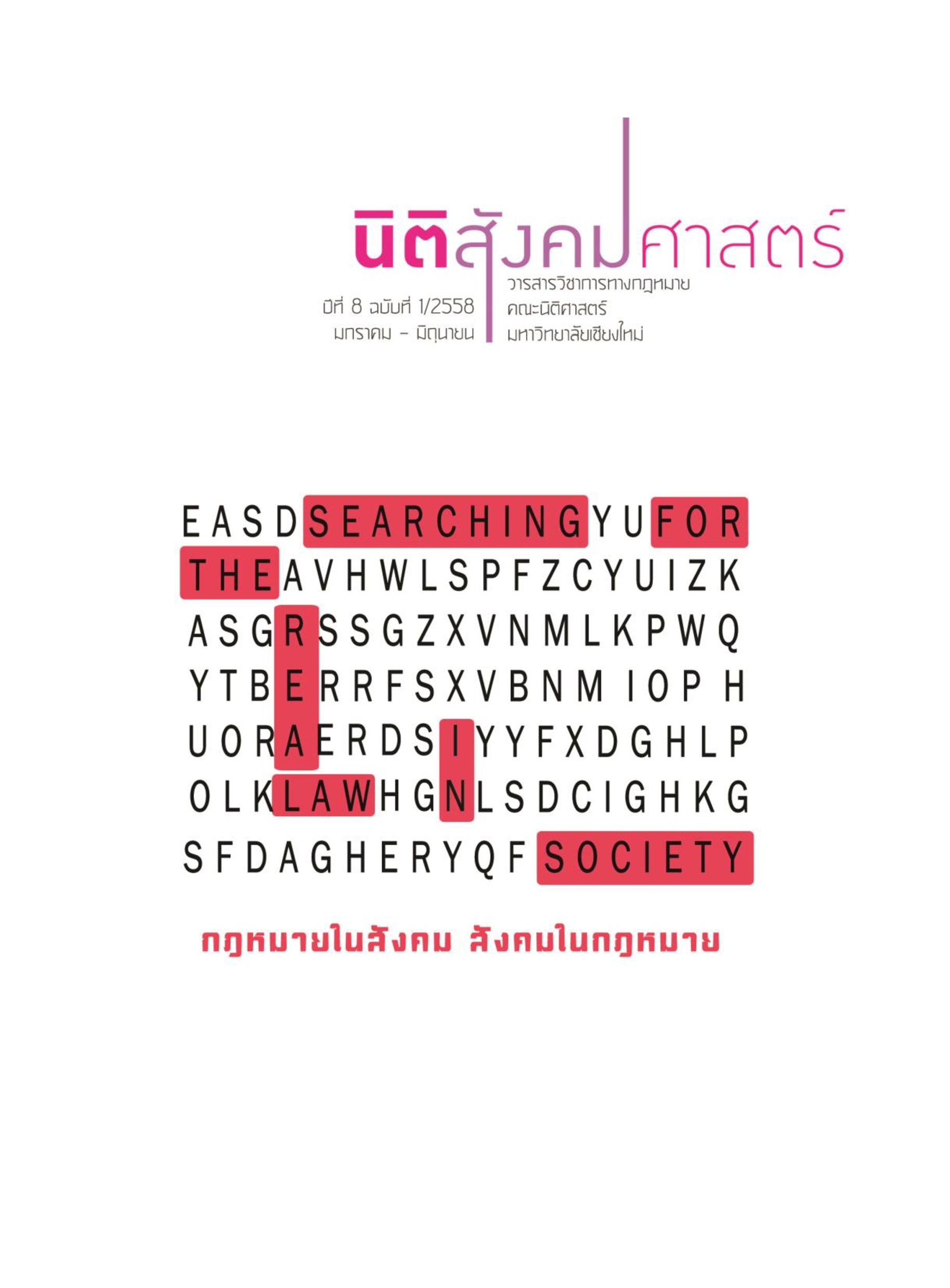การบังคับใช้สิทธิชุมชน: มองผ่านวัฒนธรรมทางกฎหมาย
Main Article Content
บทคัดย่อ
สิทธิในการจัดการป่าชุมชนได้รับการรับรองภายใต้รัฐธรรมนูญของไทย ในฐานะของสิทธิชุมชน ที่ประชาชนมีสิทธิในการมีส่วนร่วมในการอนุรักษ์ทรัพยากรธรรมชาติ โดยหลักการแล้วรัฐธรรมนูญ มีฐานะเป็นกฎหมายสูงสุด ตามที่มีการอ้างถึงแนวคิดรัฐธรรมนูญนิยม แต่ในทางปฏิบัติ กฎหมายที่เป็นอยู่จริงในสังคมไทยกลับฉายภาพที่ต่างไปจากนั้น เมื่อมีการบังคับใช้กฎหมายป่าไม้ของรัฐ ที่ให้อำนาจโดยตรงแก่เจ้าหน้าที่ผู้ปฏิบัติงาน และเป็นผู้ผูกขาดอำนาจในการจัดการทรัพยากรป่าไม้ โดยที่ไม่มีการอ้างถึงรัฐธรรมนูญ การศึกษานี้มุ่งหมายจะศึกษาและอธิบายปรากฏการณ์ทางกฎหมาย โดยการใช้วิธีสังคมวิทยาทางกฎหมาย โดยมีสมมุติฐานว่า ระบบกฎหมายของไทยไม่สอดคล้องกับการจัดการป่าชุมชน เนื่องมาจากวัฒนธรรมทางกฎหมายของไทยที่อยู่บนพื้นฐานของกฎหมายลายลักษณ์อักษร ที่ไม่สนใจการใช้กฎหมายที่เกิดขึ้นจริงในสังคม ซึ่งในกรณีนี้สะท้อนจากนิติสำนึกของชาวบ้านและเจ้าหน้าที่ของรัฐในการจัดการป่าชุมชน
ในการศึกษานี้ ใช้วิธีการสัมภาษณ์ เพื่อค้นหานิติสำนึกของผู้เกี่ยวข้อง 3 กลุ่ม ได้แก่ ชาวบ้านในพื้นที่ซึ่งเลือกมา 3 หมู่บ้าน กลุ่มเจ้าหน้าที่ผู้อยู่ในการจัดการป่าไม้ และกลุ่มนักกฎหมาย ซึ่งพบว่าชาวบ้านที่จัดการป่าชุมชน ใช้กฎหมายของชุมชน ไปพร้อมกับกฎหมายของรัฐ เพื่อสร้างกฎเกณฑ์ที่เป็นอยู่จริงในสังคมนั้น ในขณะที่ เจ้าหน้าที่ของรัฐ ตระหนักถึงการใช้กฎหมายในการจัดการป่าชุมชนที่เป็นจริงจะช่วยส่งเสริมการอนุรักษ์ป่าไม้ ในทางกลับกัน นักกฎหมายกลับยึดถือแต่กฎหมายป่าไม้ โดยไม่บังคับใช้รัฐธรรมนูญ ถึงแม้ว่าจะรู้ว่ารัฐธรรมนูญคือกฎหมายสูงสุดและไม่สนใจต่อกฎหมายของชุมชน
ผู้เขียนได้อธิบายปรากฏการณ์นี้ โดยการ “ถอดรหัส” ของวัฒนธรรมทางกฎหมายของไทย โดยการศึกษาจากบริบททางประวัติศาสตร์และสังคม ว่าระบบการศึกษากฎหมาย กระบวนการในการออกกฎหมาย ความเห็นทางกฎหมายและคำพิพากษาของศาล ล้วนแล้วแต่ก่อรูป ก่อร่าง ที่เป็นวัฒนธรรมทางกฎหมายของไทยขึ้น จากผลการศึกษา พบว่าวัฒนธรรมการใช้กฎหมาย ที่เน้นการใช้กฎหมายของรัฐแต่เพียงอย่างเดียว และการจำกัดอำนาจในการตีความกฎหมาย การใช้กฎหมาย อยู่ภายใต้ระบบของผู้มีวิชาชีพกฎหมาย มากกว่าการยึดถือหลักความยุติธรรม การมีวัฒนธรรมทางกฎหมายเช่นนี้ มาจากกระบวนการปฏิรูประบบโครงสร้างของรัฐและการปฏิรูปกฎหมาย ภายใต้กระแสโลกาภิวัตน์ และทุนนิยม ที่ผลักดันให้การจัดการป่าที่อยู่บนพื้นฐานของจารีตประเพณีของชุมชนเริ่มจางหายไป
The right to practise Community Forest Management (CFM) is guaranteed in the Thai Constitution as a community right – means people have the right to participate in natural resource conservation. In principle, the Constitution is the supreme law of the land as it proclaims that it is Constitutionalism. However, the real law in Thai society pictures differently, when state forestry law provides direct authority to government agencies and dominates forest management without reference to the Constitution. This study aims to find and explain this legal phenomenon by using Socio-Legal Studies. This study’s hypothesis is that the Thai legal system is not compatible with CFM because the Thai legal culture is based on written law and not on living law, which comes from the legal consciousness of the villagers and government officers who practise CFM.
I use interviews as a research method to investigate the legal consciousness of three groups of people involved in implementation of CFM: members of three selected northern villages; government officers; and legal professionals. The villagers’ CFM – the law of the commons – together with state law, creates their “living law”. Government officers cooperate with CFM, knowing that it will help them fulfill their mission of forest conservation. In contrast, legal professionals rely only on state forestry law rather than the Constitution, despite its supremacy, and ignore the law of the commons.
To explain this phenomenon, I “decode” Thai legal culture by investigating its historical and social contexts. I also examine the legal education system, law making processes, legal commentaries and court decisions, to understand what shapes Thai legal culture. As a result, the narrow focus on statute law in Thai legal culture, and the focus on law as a profession rather than as a justice-based discipline, can be explained by the “modernization” of Thai administration and laws, and by the encroachment of globalization and capitalism, both of which have resulted in moving away from traditional land management based on the commons.
Keywords:Community Forest Management; the commons; legal culture; legal consciousness
Article Details
O ความคิดเห็นใดๆ ที่ลงตีพิมพ์ใน CMU Journal of Law and Social Sciences เป็นของผู้เขียน (ความคิดเห็นใดๆ ของผู้เขียน กองบรรณาธิการ CMU Journal of Law and Social Sciences ไม่จำเป็นต้องเห็นด้วย)
O กองบรรณาธิการ CMU Journal of Law and Social Sciences ไม่สงวนสิทธิ์ในการคัดลอกแต่ให้อ้างอิงแหล่งที่มาด้วย
เอกสารอ้างอิง
Brenner, Verena, et al. (199). Thailand’s Community Forest Bill: U-Turn or Roundabout in Forest Policy? SEFUT Working Paper No. 3, Socio-Economics of Forest Use in the Tropics and Subtropics (Freiburg: University of Freiburg). online: University of Freiburg .
Cotterrell, Roger. (1997). “The Concept of Legal Culture”. in David Nelken ed. Comparing Legal Cultures. Aldershot, UK: Dartmouth. p.13.
Dearden, Phililp. (1995) Development and Biocultural Diversity in Northern Thailand Applied Geography 15:4, 333.
Ehrlich, Eugen. (1962). Fundamental Principles of the Sociology of Law, trans. Walter L. Moll New York: Russell & Russell.
Engel, David & Engel, Jaruwan. (2010). Tort, Custom, and Karma: Globalization and Legal Consciousness in Thailand. Stanford, CA: Stanford University Press.
Forsyth, Tim & Walker, Andrew. (2008) Forest Guardians Forest Destroyers: The Politics of Environmental Knowledge in Northern Thailand. Seattle: University of Washington Press.
Friedman, Lawrence M. (1977). Law and Society: An Introduction. Englewood Cliffs, NJ: Prentice-Hall.
Nelken, David & Orücü, Esin. (2007). Comparative Law: A Handbook. Portland, Oregon: Hart.
Ostrom, Elinor. (1995). Governing the Commons: The Evolution of Institutions for Collective Action. New York: Cambridge University Press.
Penth, Hans. (2000). A Brief History of Lan Na: Civilization of North Thailand. Chiang Mai: Silkworm Books.
Scott, James C. (2009). The Art of Not Being Governed: An Anarchist History of Upland Southeast Asia. New Haven: Yale University Press.
Silbey, Susan. (2001). “Legal Culture and Legal Consciousness” in International Encyclopedia of Social and Behavioral Sciences. New York: Elsevier, p. 8623, online: IEBS
Usher, Ann Danaiya. (2009). Thai Forestry: A Critical History. Chiang Mai: Silkworm.
เสน่ห์ จามริก และ ยศ สันตสมบัติ (บก.). (2536). รายงานวิจัยเรื่อง ป่าชุมชนในประเทศไทย: แนวทางการพัฒนา เล่ม 1 – 3. กรุงเทพ: สถาบันชุมชนท้องถิ่นพัฒนา.
กรมป่าไม้. (2539). 100 ปี กรมป่าไม้. เชียงใหม่: สำนักงานป่าไม้ เขตเชียงใหม่.
จรัญ โฆษณานันท์. (2550). นิติปรัชญา. กรุงเทพ: สำนักพิมพ์มหาวิทยาลัยรามคำแหง.
บุญตา สืบประดิษฐ์ และ อัจฉรา รักยุติธรรม (บก.). (2545). 3 ทศวรรษป่าชุมชน ท่ามกลางความสับสนของสังคมไทย. เชียงใหม่: กรมส่งเสริมคุณภาพสิ่งแวดล้อม.
ประเสริฐ ณ นคร, พิธินัย ไชยแสงสุขกุล, และอรุณรัตน์ วิเชียรเขียว (บก.), 2531 ภาคงานวิจัยที่ 3 คัมภีร์ปริวรรตกฎหมายล้านนาโบราณ กรุงเทพ: สถาบันไทยคดีศึกษา มหาวิทยาลัยธรรมศาสตร์
ประเสริฐ ณ นคร. (2521). มังรายศาสตร์ หรือกฎหมายพระเจ้ามังราย. กรุงเทพ: ภาควิชาประวัติศาสตร์ มหาวิทยาลัยศรีนครินทรวิโรฒ.
ประมวลกฎหมายแพ่งและพาณิชย์ บรรพ 4. ราชกิจจานุเบกษา เล่ม 47 หน้า 442 ลงวันที่ 18 มีนาคม 2473.
ประมวลกฎหมายที่ดิน. ราชกิจจานุเบกษา เล่ม71 ตอนที่ 78 ฉบับพิเศษ หน้า 1 ลงวันที่ 3 พศจิกายน 2497.
รัฐธรรมนูญแห่งราชอาณาจักรไทย พ.ศ. 2540. ราชกิจจานุเบกษา เล่ม 114 ตอนที่ 55 ก หน้า 1 ลงวันที่ 11 ตุลาคม 2540
รัฐธรรมนูญแห่งราชอาณาจักรไทย พ.ศ. 2550. ราชกิจจานุเบกษา เล่ม 124 ตอนที่ 47 ก หน้า 1 ลงวันที่ 24 สิ่งหาคม 2550
รัตนาพร เศรษฐกุล. (2552). ประวัติศาสตร์เศรษฐกิจวัฒนธรรม แอ่งเชียงใหม่ – ลำพูน. เชียงใหม่: ซิลค์เวอร์ม.
ศาลรัฐธรรมนูญ, คำวินิจฉัยที่ 15/2552 ลงวันที่ 4 พฤศจิกายน 2552
สุรัสวดี อ๋องสกุล. (2552). ประวัติศาสตร์ล้านนา. กรุงเทพ: อัมรินทร์.
หยุด แสงอุทัย และสมยศ เชื้อไทย. (2553). ความรู้เบื้องต้นเกี่ยวกับกฎหมายทั่วไป. กรุงเทพ: สำนักพิมพ์มหาวิทยาลัยธรรมศาสตร์.
อรรถจักร์ สัตยานุรักษ์. (2545). นิเวศประวัติศาสตร์: พรมแดนความรู้. กรุงเทพ: โครงการจัดพิมพ์คบไฟ.
อรุณรัตน์ วิเชียรเขียว. (2540) สารคดี ฉบับ รำลึกเมืองเชียงใหม่ 700 ปี.

